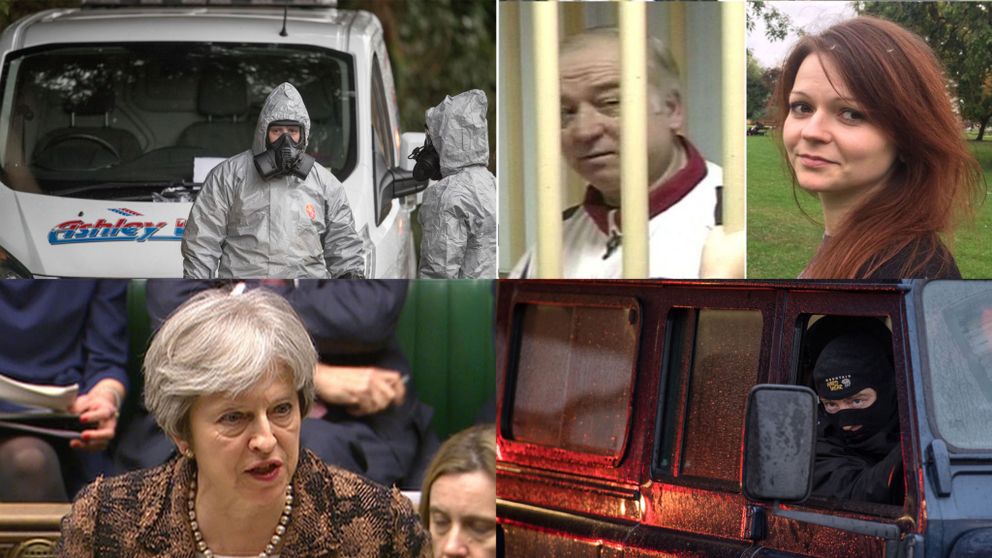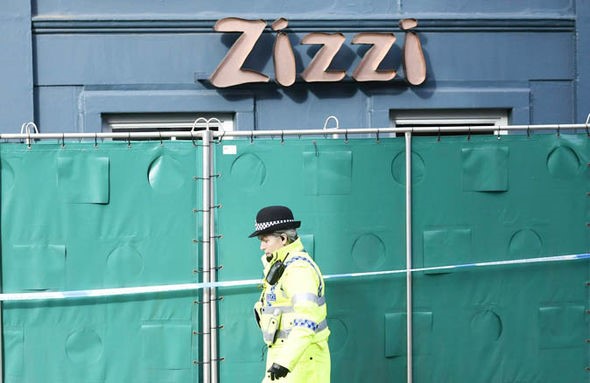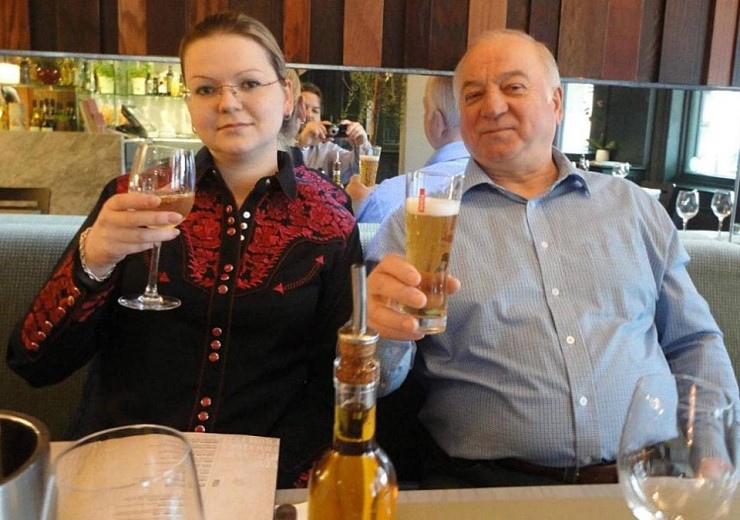Ever since Russia’s intervention in the Syrian Civil War in December 2015, it has run into many conflicts with the United States and its allies in the western part of Europe. The tension between these countries escalated to a new level after the poisoning of a former Russian intelligence officer in Salisbury, an English city on March 4, 2018. The British accused Russia of staging the attack on Sergei Skirpal (66), and his daughter Yulia Skirpal (33) as the poison was identified as a chemical developed by Russia. On March 14, Theresa May issued an expulsion order for 23 Russian diplomats and their families, as Russia failed to explain why the Russian-made chemical was used on British soil on the former spy and his daughter. A diplomatic war is imminent if solid evidence pointing to who is behind the poisoning fails to emerge and will worsen as the United Kingdom claims that Russia should be held accountable for the attack.
 |
| ▲ Russian spy incident has brought intense relationship between the UK and Russia. (Photo by SkyNews) |
The victim, Sergei Skirpal, is a retired Russian military intelligence officer who was jailed for 13 years by Russia after selling out the identities of Russian undercover spies in Europe to UK’s intelligence service, MI6. In July 2010, he was released by Russia in a prisoner exchange with the United States and later flown to the UK to settle down in Salisbury.
According to an investigation by local police, this is a case of attempted murder as traces of Novichok, a nerve agent used by the Soviet Union in the 1970s and 80s were found around the site where Skirpal and his daughter were discovered. At 4:15 local time, emergency services received calls reporting the incident and Skirpal and his daughter were found on a bench outside a restaurant in extremely serious condition. They spent months in hospital recovering, but have since been released following treatment at the Salisbury District Hospital.
 |
| ▲ The restaurant where the pair visited and got attacked afterwards was closed down for investigation. (Photo by Express UK) |
Following the order by the British government to expel the Russian diplomats, EU countries also took strong steps against Russia, calling the prohibited chemical weapons attacks as an "unforgivable attack". Many EU countries and the United States have launched strong sanctions against Russia, despite the lack of clear and verifiable evidence proving it was a chemical attack staged by Russia. In order to understand the diplomatic relationship between Russia and Western countries, the Dankook Herald (DKH) conducted an interview with Professor Kim Sun-rae from the Institute of Russian Studies at Hankuk University of Foreign Studies. Kim argued that we all should be extra careful when considering this case because it is a very sensitive topic and the global community have yet to determine whether or not the Russian government was clearly behind the case. Kim believes this incident will only lead to a more stiffened relationship between the UK and Russia as the distrust of Russia is already high. In fact, he stated that relations between the UK and Russia have been worsening since the UK responded to the annexation of Crimea by Russian.
Kim stated that the UK has been taking the case very seriously because of a similar incident, involving a Russian double agent that occurred in November 2006, when Alexander Litvinenko was killed in a chemical attack in the UK. When the British government demanded Russian produce two of its citizens who were crucial to the investigation, they refused to comply and instead returned them to Moscow.
 |
| ▲ Photo of Sergei (right). (Photo by Standard UK) |
Kim believes the EU’s strong actions against Russia, including the expulsion of Russian diplomatic officers is an emotional reaction because there is not enough proof to confirm it was executed by Russian. However, the political situation behind the relationship between the EU and the Russian government might have affected this case.
When asked how the Korean government should react, Kim replied that they were wise to stay out of the conflict between Western society and the Russian government in the 2014 Ukraine case and similar to this, it’s better for the Korean government not to formally address the matter, but rather try to be the third party as much as possible. Meanwhile, the attempted assassination of the Russian former agent in the UK was a big issue for Western countries. France, Germany, the United States and the United Kingdom all agreed measures to protest actions by the Russian government were ‘the only adequate way’ to respond. Moreover, the European Council concluded that Russia was most highly likely responsible for the incident. As a result, 145 Russian diplomats were sent home from many western countries as the relationship between the UK and Russia worsened. Donald Trump, President of the US expelled about 60 Russian diplomats reasoning ‘the riskiness of violating the Chemical Weapons Convention’. In response, Russia booted out about 60 US diplomats and shut the US Consul General down. Fourteen EU countries, including Germany and France, banned together in holding Russia responsible and expelled Russian diplomats just as other countries did. Canada, the Ukraine, Norway and Macedonia also agreed on the policy and rejected Russian diplomats too. Italy didn’t respond immediately, but later expressed sympathy with UK saying that ‘Russia is guilty and the UK has the right to hear an explanation from Russia’. After their former Prime Minister Paolo Gentiloni telephoned UK Prime Minister Theresa May, he was quoted as saying, ‘the demand from the UK for a clear, specific explanation from Russia in this circumstance is perfectly reasonable’. He later joined Donald Trump, President of United States, Angela Merkel, German Chancellor and Emmanuel Macron, President of France in issuing a statement with the British Prime Minister urging Russia for a serious concrete explanation of this case. The synopsis of the reactions of many countries can be summed up as putting the blame on Russia.
This incident resulted in many countries operating on high alert and meant the security of all nations had to be taken more seriously. Today, international relations remain anxious within the intelligence community. It is only natural phenomenon that many countries will start to focus on escalating the playing field of spies. The response of the UK, US, Russia and other countries to expel each other’s diplomats is just one of the many aspects that show the significance of secret information. As the ‘spy war’ is gaining a new height, it remains to be seen which party stands to gain the most from it.
Edward Ng, 김민, 박근후 dankookherald@gmail.com
<저작권자 © The Dankook Herald, 무단 전재 및 재배포 금지>

![[Campus Magnifier] Let's Surf the Library!](/news/photo/202404/12496_1765_4143.jpg) [Campus Magnifier] Let's Surf the Library!
[Campus Magnifier] Let's Surf the Library!
![[Campus Magnifier] Let's Surf the Library!](/news/thumbnail/202404/12496_1765_4143_v150.jpg)





